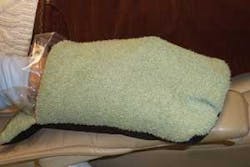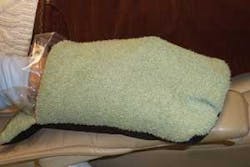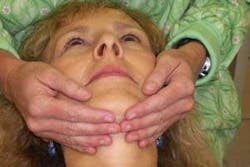The Power of Touch
A simple touch reinforces the connection with patients.
by Suzanne Hubbard, RDH
“Too often we underestimate the power of a touch, a smile, a kind word, a listening ear, an honest compliment, or the smallest act of caring, all of which have the potential to turn a life around.”
– Leo Buscaglia
As dental professionals, we’re constantly bombarded with infection control procedures, masks, gloves, eyewear, and a host of other products to reduce the transmission of disease. We may often feel as if we’re interacting with patients in a hermetically sealed suit. This is good, however, because it provides patients and us with the necessary precautions to prevent disease transmission. But ask patients, and they may feel as if a warm connection has been lost. The only things patients see are the whites of our eyes and our gloved fingers. The power of touch can be lost during dental treatment.
With the ever-increasing awareness to become more user friendly in our operatories, many dental professionals are turning to other methods to connect with patients. Spa dentistry is one of those avenues where dental professionals are venturing “out of the box.” This type of dentistry has been around for years, providing such services as paraffin hand waxes, massage therapy that includes carpel tunnel/medial nerve stimulation, and myofacial penetration/relaxation.
This avenue of dentistry has always fascinated me, as I continuously look for fresh ways to connect with patients and make them more comfortable. On a whim, I approached my dentist with the notion of providing an atmosphere where patients would “love to come” see me. With the dentist’s approval, we bought paraffin wax tub, mitts, neck pillows, aromatherapy, lavender-misted warm guest towelettes, and massage lotions. We introduced patients to the complimentary concept, and they slowly took to the idea.
At first they asked, “What does this have to do with dentistry?” and “How much is this going to cost me?” We told them that this complimentary service has everything to do with dentistry. The paraffin wax treatment is a pampering service that allows patients to relax, and it provides an atmosphere of concentrated teaching for oral hygiene instruction. It does not allow patients to squeeze or white-knuckle the arm rests or use cell phones during treatment.
Included in the paraffin wax treatment are forearm massage, kneading the wrist around the medial nerve, and flexing of the fingers. This service is valuable to patients who work in fields where repetitive motion is necessary. When patients are “under the influence of wax,” they become calm and naturally open up to oral hygiene instruction.
Myofacial stimulation is used as an adjunct to extraoral examinations. Our office uses light, aromatic facial lotions. These provide a great medium for massaging tired masseter muscles and stimulating blood flow to facial muscles and relaxing trigger points in the jaw, eye, and cheeks. As part of the extraoral examination, the massage is an extension for detecting any lumps or bumps that could be early signs of skin cancers, TMD/TMJ disorders or thyroid conditions. Some clinicians do find facial massages intrusive, and they can leave them feeling vulnerable to infection. However, massage therapists and estheticians have been using ungloved hands for years!
Clinicians may also be skeptical and wonder, “Where could I possibly fit this in my treatment plan? Who has time to do this type of service? Is this within the scope of my responsibility?” These services add 10 minutes to treatment, and as far as scope of practice and responsibility, this is another modality to consider when offering treatment options.
Spa dentistry can be for everyone. It isn’t a service that has to fit a special or privileged clientele. The service isn’t age or gender specific, and what I have appreciated in my own clinic is how the male clientele enjoy it just as much as the female clientele. Patients Jack and Kay Antonsen agree, “It’s a treat! We love the wax treatment.”
“Normally when I am in the dental chair, I grab for anything I can get my hands on,” said Kay. “It’s a natural reaction. Having the paraffin hand wax allows me to concentrate on my treatment rather than what I can grab. The facial massage is also great. I like putting the cares of my day away while being massaged!”
The Touch Research Institute has shown that touching has many powerful, positive effects, including enhanced attentiveness, alleviation of depression, reduction of pain, and improved immune function. Using touch is one more way dental auxiliaries can provide clinical care to their patients, and it’s a connection worth making.
About the Author
Suzanne Hubbard, RDH, works in Greeley, Colo., at GB Dental Clinic.


